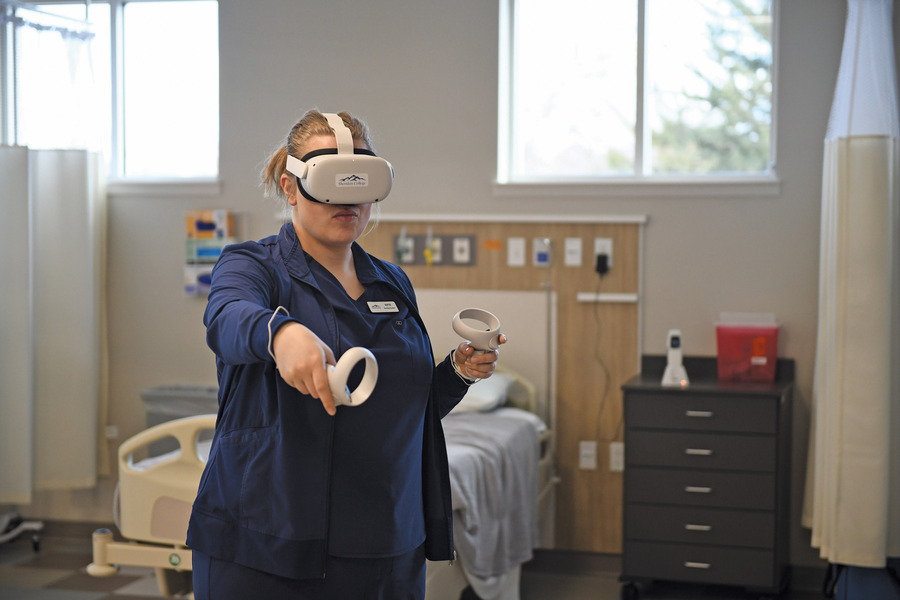How to Teach Nursing Students to Insert a Foley Catheter/Indwelling Catheter
.avif)
Mastering the procedure of inserting a Foley catheter, more recently known as an indwelling urinary catheter, is not just a skill but a crucial aspect of a nursing student's education. It goes beyond the technical aspects, requiring a compassionate approach for successful insertion and maintenance. This mastery is not just about providing quality patient care but also about ensuring patient comfort.
It's important to mix modalities to educate students well on inserting an indwelling catheter. Here are five ways to do so.
Ways to Teach the Foley Catheter/Indwelling Catheter
1. High-Fidelity Manikins
High-fidelity manikins offer realistic, hands-on practice for nursing students. These manikins can simulate human responses such as urination, enabling students to practice indwelling catheter insertion in a controlled, realistic environment. They offer a risk-free opportunity for students to learn and make mistakes.
2. Immersive Virtual Reality
Immersive virtual reality tools, like UbiSim, a nursing VR training platform, allow nursing students to practice therapeutic communication in a way that may not be possible with other modalities. Students can speak to a patient who will make eye contact and respond to their questions and comments.

UbiSim also has an Intuitive Editor that enables admins to add the indwelling catheter to any scenario and customize its aspects. This flexibility allows for tailored training scenarios that can simulate a variety of patient conditions and challenges, ensuring students are well-prepared for real-world situations.

3. Videos
Educational videos are a valuable resource for demonstrating the step-by-step process of indwelling catheter insertion. Videos can show close-up views of the procedure, highlight best practices, and illustrate common mistakes. They can be watched repeatedly, allowing students to review and reinforce their learning at their own pace.
4. Task Trainers
Task trainers are specialized models or simulators that focus on specific skills, such as catheter insertion. These tools allow students to repeatedly practice the mechanical aspects of the procedure until they achieve proficiency. Task trainers are particularly useful for developing muscle memory and ensuring students are comfortable with the tactile components of catheter insertion.
5. Standardized Patients
Standardized patients are actors trained to portray real patients, allowing students to practice their skills in a realistic clinical setting. Although they won’t practice the tactical ways of inserting ti, this method allows students to experience the human elements of patient care, such as communication, empathy, and patient education. Interacting with standardized patients helps students build confidence and improve their bedside manner.
Final Thoughts
Teaching nursing students how to insert an indwelling catheter requires a multifaceted approach that combines different educational modalities. By incorporating high-fidelity manikins, immersive virtual reality, educational videos, task trainers, and standardized patients, educators can provide comprehensive training that prepares students for real-world clinical practice. This blended learning strategy ensures that students not only master the technical skills but also develop the communication and empathetic skills necessary for high-quality patient care.


As an integral center of UbiSim's content team, Ginelle pens stories on the rapidly changing landscape of VR in nursing simulation. Ginelle is committed to elevating the voices of practicing nurses, nurse educators, and program leaders who are making a difference.
Explore more

Top 5 Signs Your Nursing VR Sims Aren't Immersive
If learners are clicking menus instead of making decisions, your VR nursing sims may lack immersion. Here are 5 red flags—and what to look for instead.

Is Your Nursing VR Experience Hitting the Mark? Here’s How to Tell
Is your nursing VR truly immersive? Discover how to tell if your simulation empowers learners to think, act, and feel like real nurses every step of the way.

Nursing Simulation Decisions: Manikin Programming vs. VR Custom Scenarios
Compare manikin-based vs. VR nursing simulations. Discover how UbiSim empowers educators to create immersive, customizable, real-world scenarios.